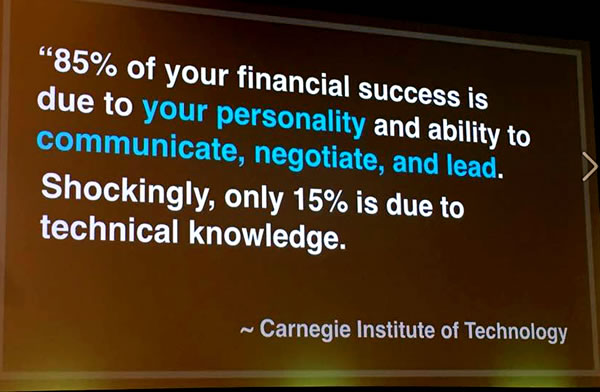
Found via Ray Higdon.
Don’t get me wrong, having technical skill is valuable. But as a reader of this blog, you may be aware that sometimes, we focus on tech skills almost exclusively, to the detriment of other ones, including people skills. Even the name we give them — soft skills — shows the low regard in which we hold them, despite the fact that time and again, they often make the difference between success and failure. There’s a reason why the phrase “unrecognized genius” is a cliche.
As techies, we’re often reading books to improve our abilities. Why not, instead of picking up one that will improve your grasp of a programming language, framework, or operating system, pick up a book on soft skills? John Sonmez’ book, Soft Skills: The Software Developer’s Life Manual, is a book that aims to teach those valuable people and life management skills in a way that appeals to software developers and other techies. It’s broken down into the following sections:
- Career: “Few software developers actively manage their careers,” Sonmez writes, “but the most successful developers don’t arrive at success by chance.” He starts off the book with a section that covers how to actively guide your career, the kinds of opportunities you might want to pursue, and how to navigate all the tricky passages you’ll encounter, whether it’s company politics, working for yourself or someone else, working on-site or remotely, the value of people skills, and the importance of not getting religious about technology.
- Marketing Yourself: As a developer turned marketer, I know the bad reputation that marketing has. When a developer says “So-so moved to marketing”, it’s usually said with the same tone of voice as “So-so died…horribly and painfully.” But we often forget that marketing gets people’s attention, drives them to take action, and when done properly and ethically, offers people real value and keeps them coming back for more. You can’t succeed in any aspect of business — or even life — if you don’t market yourself.
- Learning: In a field like ours — remember, the definition of “computable” isn’t even a century old yet — things are constantly changing, and as a result, we have to keep learning. Sonmez explains how to “keep your saw sharp”.
- Productivity: I’ve seen a lot of geeks whose productivity comes in great spikes followed by doldrums of getting nothing of consequence done. The technology we work with comes with powerful distractions, from social media to cat videos to videogames, and it’s all too easy to while away the time. This section has some great advice on how to get down and get to work, how to be accountable, and if necessary, how to deal with burnout.
- Financial: Since a techie career often pays pretty well, it’s surprising to outsiders how uninteresting money is to many of us. However, to quote a much-loved geeky literary work, with great compensation comes great financial responsibility. Sonmez covers money management, retirement plans, the stock market, real estate and other matters that you’d do well to consider. He includes some additional information about finances and stocks in the appendices.
- Fitness: A mind can’t stay sound in an unsound body, and this is something that Sonmez can write about with some authority, as he’s been into fitness since his teen years and entered his first bodybuilding competition when he was 18. He explains why and how you can hack your health, and even threw in some additional diet and nutritional information in the appendices.
- Spirit: Before you start backing away, what Sonmez means by “spirit” is that inner force or motivation that can either put you on the path to success or send you careening into the chasm of failure. This section covers facing life with the right attitude, coping with both success and failure, and even managing love and relationships. (And yes, he couldn’t resist throwing in a “forever alone” graphic into the “love and relationships” chapter.)
Don’t let the fact that the book has over 70 chapters worry you. As Sonmez points out in this Java Code Geeks interview, he broke the book into many small chapters so that it would be easier to read to the end of whatever chapter you were currently on, no matter how pressed you were for time. “I really wanted to make the book the kind of book that you enjoyed reading; a book that you could just pick up and read whatever parts happened to be relevant to you at the time.”
I wish I had this book when I was starting out on my career, but even at this stage of the game (20 years in, if you must know), there’s stuff in it that I found in Soft Skills that made me go, “Hey, I think I’ll try that.” If you’ve been thinking about picking up a new book to sharpen your saw, try a non-technical one — Soft Skills: The Software Developer’s Life Manual — for a change. You might find it paying off in more ways than you’d expect.
Bonus! Today only — Wednesday, June 10, 2015 — Soft Skills is available in ebook form for 50% off with the promo code dotd061015, which knows its price down to a mere US$13.99.
